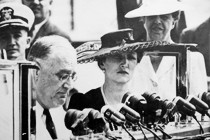The Bothersome Man
by Annika Pham
- Jens Lien's surreal black comedy, which shakes up the all-too-perfect Scandinavian way of life, has been collecting awards at international festivals since its launch in the Cannes Critics' Week 2006
Winner of Best Director, Best Script and Best Actor Amanda Awards (Norway’s top film honours), the film also picked up Best Director at Athens 2006, the FIPRESCI Award at Göteborg 2007 and, most recently, the Grand Prize, International Critics’ Award and Sci-Fi Jury Award at the Fantasy Film Festival in Gerardmer, France. These are just a handful of awards and the list is still growing. Not just festival juries and critics, but international distributors as well have fallen for Jens Lien’s "Norwegian Truman’s Show". Sold by Bavaria Film International, The Bothersome Man [+see also:
trailer
interview: Jens Lien
interview: Jørgen Storm Rosenberg
film profile] has been acquired by a dozen territories and opens on March 28 in France (CTV International).
The Bothersome Man is Lien’s’ third collaboration with scriptwriter Per Schreiner, after their convincing short films Shut the Door (2000) and Natural Glasses (2001), shown in competition at Cannes. It is based on Schreiner’s own successful radio play created, according to him, because he wanted to "write a horror film for radio". In Lien’s skilled directing hands, horror is a feeling that gradually develops in the film as the lead character, 40 year-old Andreas, is thrown into a Kafka-esque world that he does not understand and from which there is no escape. The nightmarish scenario is also a perfect pretext for Lien to fully explore his visual style.
Immediately after a suicide attempt, Andreas (Trond Fausa Aurvåg) finds himself on a bus that drops him off, seemingly, in the middle of nowhere (Iceland’s Sprengisandur National Desert Reserve seen in Noi Albinoi). A stranger takes him to an unknown city, into a tidy and impersonal flat that becomes his "home sweet home". He is offered a job in an office by an over-friendly boss and easily finds a girlfriend among very friendly and cordial colleagues. All is too good to be true.
As his effortless new life becomes routine, Andreas starts noticing that the people are actually emotionless and that discussions about their IKEA furniture and homes are all that matter to them. Food is also tasteless, smells and music are banned and children do not exist – he finds all these things only through a hole he digs furiously when this world finally becomes unbearable. What is paradise for the lot is hell for him; life is not worth living anymore for our anti-hero, who relentlessly tries to commit suicide under a subway.
However, filmed in a slapstick way, the suicide scenes are more entertaining than scary and Fausa Aurvåg’s pantomime look and bodily expressions keep the tone comical. What could have been a dreadfully dark tale is, in fact, a rather funny and certainly incisive look at Scandinavian modern society and social democracy. Lien subtly asks the existential question "Is happiness being part of the norm?", making sure the answer is left open for the audience. His travel into the absurb and dystopia is intriguing and engaging, served by meticulously chosen locations and greyish colours reminiscent of Roy Andersson, which help create the feeling of an afterlife. The film is a successful attempt at a genre rarely explored in Norwegian cinema and establishes Lien among the best of his Nordic contemporaries.
Did you enjoy reading this article? Please subscribe to our newsletter to receive more stories like this directly in your inbox.


















